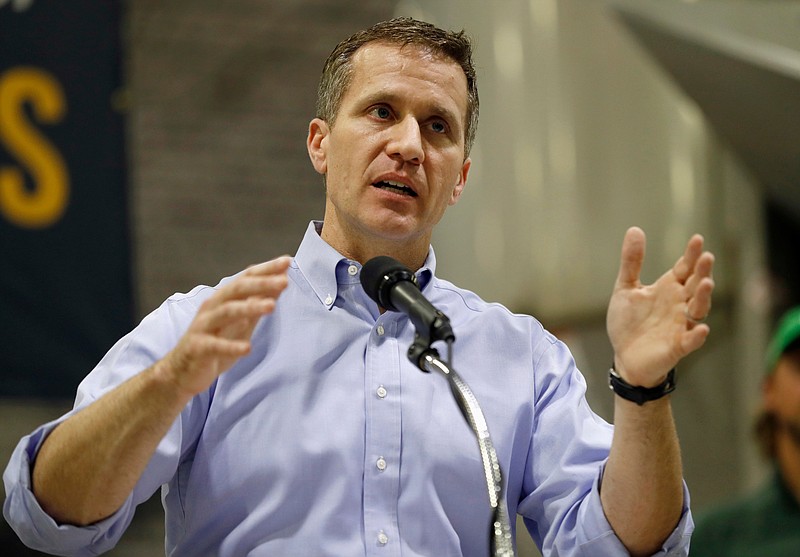Catherine Hanaway wants Cole County Circuit Judge Jon Beetem to dismiss a nearly two-month-old lawsuit that demands records from A New Missouri Inc., the not-for-profit organization formed in early 2017 to support then-Gov. Eric Greitens and his initiatives.
Hanaway is a former Missouri House speaker and former U.S. Attorney who, now in private practice, represents A New Missouri in the lawsuit filed June 22 by Elad Gross, a St. Louis lawyer and former assistant attorney general, who has said he's trying to get more information about the group.
Hanaway filed her motion to dismiss last week.
Gross asked the court Monday to deny the motion, or to treat it, instead, as a motion for summary judgment, which would allow him to make discovery requests to produce the same information he said A New Missouri has, so far, not provided to previous requests.
Beetem set a brief hearing for Sept. 14, when the parties are to schedule a time for more detailed arguments.
Gross' lawsuit argued, because A New Missouri has "no members," individual Missourians are entitled to get details of the group's financial operations.
Hanaway's motion to dismiss the lawsuit said Gross has no legal standing to file it and failed "to establish that (he) is a beneficiary of any services or activities of (A New Missouri) entitled to enforce the statutory remedy sought in the (suit)."
Gross' motion filed Monday countered: "A New Missouri Inc. is organized as a nonprofit public benefits corporation under Missouri law."
Also, Gross said, since A New Missouri claims to conduct activities for "the advancement of social welfare by promoting policies and/or legislation to create more jobs, higher pay, safer streets, better schools, and more, for all Missourians," then, as a Missourian, he benefits from the group's work.
Hanaway said A New Missouri is organized under the IRS code as a 501(c)(4) organization, and is "not a charity set up to benefit a particular group" but, instead, "promotes social welfare in general."
She added, "Nothing it does inures to the benefit of any one person, including (Gross)."
Because of that designation, Hanaway argued, the state law Gross used as the basis for filing his lawsuit "does not provide a general right of the public to access corporate records of nonprofits established for social welfare purposes."
Gross countered: "Until this lawsuit, Defendants held out A New Missouri as an organization that benefited Missourians. But now, when Defendants are asked to comply with their responsibilities under the law from which they benefited, they refuse to do so."
In addition to A New Missouri, Gross' lawsuit named three of its officers as defendants.
Hanaway asked the court to remove those three from the lawsuit, arguing: "As a matter of law, (Gross) has not and cannot state a claim against these parties. Nothing in that statute (that Gross used as the basis for his lawsuit) authorizes suit against individuals."
However, Gross wants Beetem to consider that: "(The individuals') repeated refusal to respond to (my) requests for records constitutes a violation of Missouri law.
"Defendants should not be dismissed from this case as a result of their wrongdoing."
When he filed the lawsuit, Gross described A New Missouri, in a Facebook post, as "the secretive political organization set up by former Gov. Greitens and his team. These types of organizations have been increasingly used to hide political donors and influencers from public disclosure.
"They are the facilitators of dark money politics."
Days after it was filed, Hanaway called Gross' lawsuit "ridiculous," and accused him of being "clearly a Democrat operative trying to prolong the Greitens saga for political purposes."
Gross' lawsuit is separate from state Rep. Jay Barnes' recent complaint to the Missouri Ethics Commission that the creation of A New Missouri violated the campaign finance limits that voters adopted when they passed Amendment 2 on Nov. 8, 2016 - the same election where Greitens won the governor's office.
After voters approved new campaign limits of $2,600 per person, per election, Barnes' complaint said: "The principals of Greitens' (campaign committee) set up A New Missouri Inc. for the purpose of evading the newly-enacted campaign finance laws," and A New Missouri was created "as an entity through which to direct over-the-limit contributions to Greitens for Missouri."
The complaint said the "plain language of the Missouri Constitution," as well as state law and a 2018 Ethics Commission Advisory Opinion require A New Missouri to "register with the MEC and file reports. However, it has failed to do so."
The Ethics Commission, by law, cannot acknowledge if it's investigating a complaint like Barnes made - and has made no comment about the Barnes complaint.

